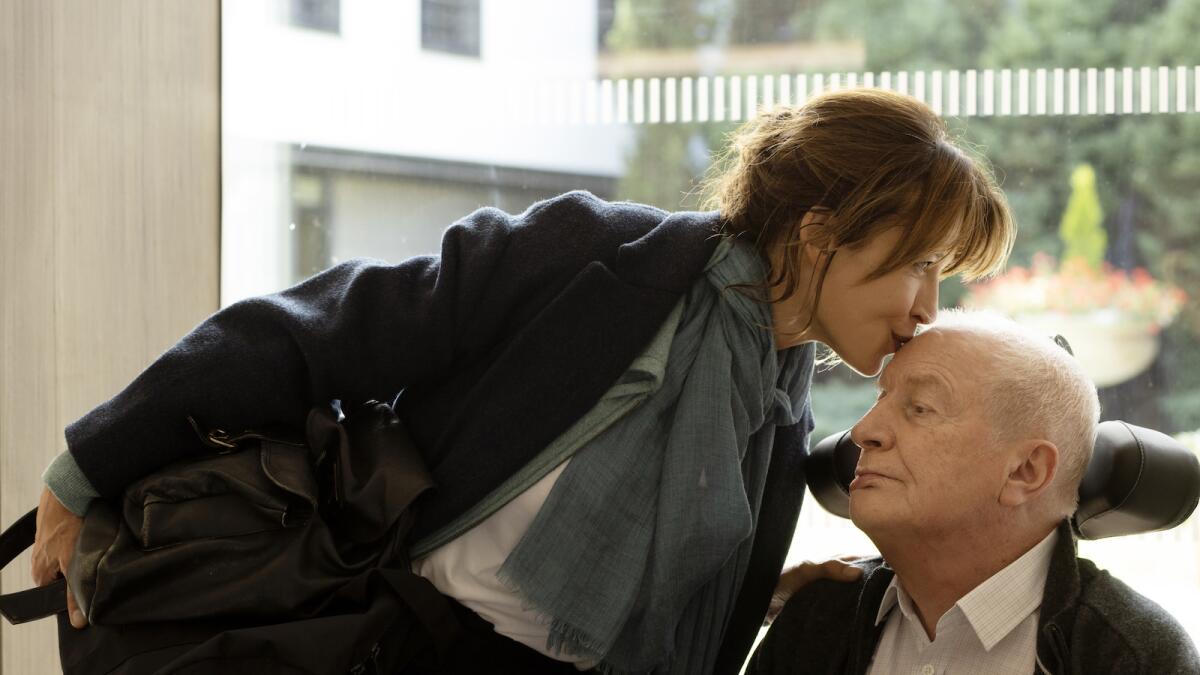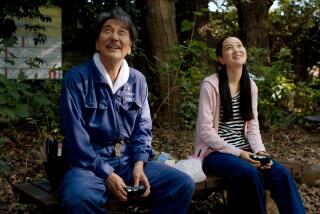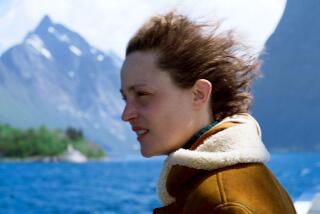Review: ‘Everything Went Fine’ reveals the love required to grant the ultimate final wish

The standard family contract is built on an accepted progression of milestones given due celebration, and mourned exits treated as the shocks they usually aren’t. But the rhythm of that wide-ranging togetherness is disrupted in François Ozon’s “Everything Went Fine” when an elderly, infirm father (André Dussollier) makes a hard request of his adult daughter (Sophie Marceau): Can his goodbye be sped up?
Movies about someone’s desire to die on their own terms — the reality-based kind, not death-wish action films — are few and far enough between that the topic is still treated like an op-ed issue first, a story about people second. But Ozon’s observant, sensitive adaptation of Emmanuèle Bernheim’s same-titled memoir about assisting her dad’s dying is the furthest thing from a topic-driven morality play (as the contours of Ozon’s 2017 priest abuse docudrama “By the Grace of God” necessitated it partly become).
For the record:
3:27 p.m. April 24, 2023An earlier version of this review said Emmanuèle Bernheim died in 2019. She died in 2017.
Instead, “Everything” — anchored by strong performances from Marceau and Dussollier — is a refreshingly in-the-moment chronicle of what it means to love someone enough to grant them something so final, and, in a society that doesn’t fully accept it, to see it through legally and logistically. By turns life-affirming and anguished, but never sentimental, it’s also adapter Ozon’s fitting tribute to a treasured collaborator: author Bernheim, who co-wrote a handful of the prolific filmmaker’s earlier successes — “Under the Sand” and “Swimming Pool” — died of cancer in 2017.
When their art-collector father André (Dussollier) suffers a debilitating stroke, novelist Emmanuèle (Marceau) and her sister Pascale (Géraldine Pailhas) swing into action as attentive carers at the hospital. Never easy to deal with but cherished by his daughters for his zestful approach to life, André would nevertheless rather go than fight. That he assigns this psychologically straining task to Emmanuèle — the one he had the most up-and-down relationship with — is viewed by the sisters as an act of either “love or perversity.”
Emmanuèle and Pascale agree that they can’t refuse their rascally charming dad. But as his recovery reignites his personality, and the careful severity of the assisted-suicide process becomes apparent — plotting it all with the guidance of a kind Swiss woman (a beatifically grandma-like Hanna Schygulla) from a right-to-die association, while avoiding legal peril — they can’t help but hold out unspoken hope that his lust for life will spark again.
It’s to Ozon’s credit, however, that we never view André as a lost cause but, rather, someone eagerly directing his own last scene, with resigned, affectionate, if sometimes exasperated conspirators. At heart, in its firmness of pace and shotmaking, “Everything Went Fine” is like a family procedural — sometimes tearful, sometimes funny, even suspenseful. (It’s not just the authorities they have to look out for, but an unstable ex of André’s.) For all its spirited matter-of-factness, “Everything Went Fine” could be about a tense holiday, a fraught wedding or an amicable divorce. Though we’re in the chronology of an ending, Ozon wisely orchestrates a timeline of living, not dying.
The detail-rich performances keep it soberly affirming. We’re always in Emmanuèle’s space, whether she’s alone and pensive, on her toes with dad, comforted with her lover (Eric Caravaca), or with Pascale and freer to feel things; and Marceau covers it all with a commanding mix of energy and poise. Dussolier, meanwhile, understands acutely that André is one of life’s scene-stealers, whether the focus is pity or vitality — his portrayal defines the phrase “a piece of work.” And Pailhas plays the supportive sister with just enough prickliness to suggest all the complexity within that fondness.
But the movie’s truest line belongs to Charlotte Rampling. She’s only in a handful of scenes, the long-suffering, grim-faced wife of André, an openly gay narcissist whom she never divorced, and now too ill herself to care about him. But she was also an acclaimed clay and cement sculptor — Claude de Soria — and in a flashback in her studio, her daughter wonders why all her work is so gray. “There are so many colors in gray,” she says.
'Everything Went Fine'
In French with English subtitles
Not rated
Running time: 1 hour, 50 minutes
Playing: Laemmle Royal, West Los Angeles
More to Read
Only good movies
Get the Indie Focus newsletter, Mark Olsen's weekly guide to the world of cinema.
You may occasionally receive promotional content from the Los Angeles Times.










